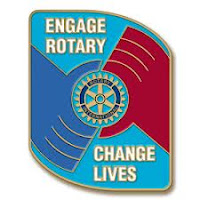 I spent the morning of the 10th
December 2013 listening to the celebration of Nelson Mandela's life. His family, friends and world leaders all
praised his leadership and courage but, more importantly, invited the world to
continue the fight for justice, tolerance and equality.
I spent the morning of the 10th
December 2013 listening to the celebration of Nelson Mandela's life. His family, friends and world leaders all
praised his leadership and courage but, more importantly, invited the world to
continue the fight for justice, tolerance and equality.
I can recall several Mandela
moments over the years during which I have been inspired to work in my own
small way to improve the lot of people across the world. I guess I would have to say that Rotary has
been a key vehicle to allow me to realise this work. By focusing on Peace and World
Understanding, Rotarians are following the ideals that Madiba encouraged in all
of us.
As President Obama noted in his
speech on the 10th December, "For
the people of South Africa, for those he inspired around the globe – Madiba’s
passing is rightly a time of mourning, and a time to celebrate his heroic
life. But I believe it should also
prompt in each of us a time for self-reflection. With honesty, regardless of
our station or circumstance, we must ask:
how well have I applied his lessons in my own life?"
So what small legacy can each of
us leave in remembrance of Mandela? Our
actions in relation to any of our 6 Areas of Focus will help influence the
struggles for justice and peace. Our
giving to our Rotary Foundation will help future generations of Rotarians in
their work.
 More specifically we have our
Rotary Peace Centers and the scholarships for present day activists. This programme continues to support the many
struggles across the world and provides a growing network of individuals who
are "Doing Good in the World" and Rotarians who better understand
many of the issues they are trying to tackle.
More specifically we have our
Rotary Peace Centers and the scholarships for present day activists. This programme continues to support the many
struggles across the world and provides a growing network of individuals who
are "Doing Good in the World" and Rotarians who better understand
many of the issues they are trying to tackle.
Our work on the eradication of
Polio not only enables us to rid the world of only the second global disease in
history, but ensures that every child on this globe has the opportunity to have
some form of health care and attention.
Mandela was keen to help us Kick
Polio out of Africa, we have an obligation to finish the job everywhere.
We need many more
"activists" both locally and internationally. I have come across many Rotarians who are
doing their bit, quietly and without fuss in the past 6 months. How much more could we do if we encourage
more people in our communities to Engage with Rotary? How many more Lives can we Change?
President Obama went on to say
that "We, too, must act on behalf of
justice. We, too, must act on behalf of
peace. There are too many of us who happily embrace Madiba’s legacy of racial
reconciliation, but passionately resist even modest reforms that would
challenge chronic poverty and growing inequality. There are too many leaders who claim
solidarity with Madiba’s struggle for freedom, but do not tolerate dissent from
their own people. And there are too many
of us who stand on the sidelines, comfortable in complacency or cynicism when
our voices must be heard."
None of our world leaders are
perfect and it is all too easy to be cynical about their words but it is true
that we all, as citizens of the world, have a part to play.
How will you make your voice
heard? We can start locally by embracing
diversity and change in our own Clubs; By encouraging the use of the ethical
values embodied in our 4-Way Test; And by continuing our humanitarian work,
wherever it is needed.
















